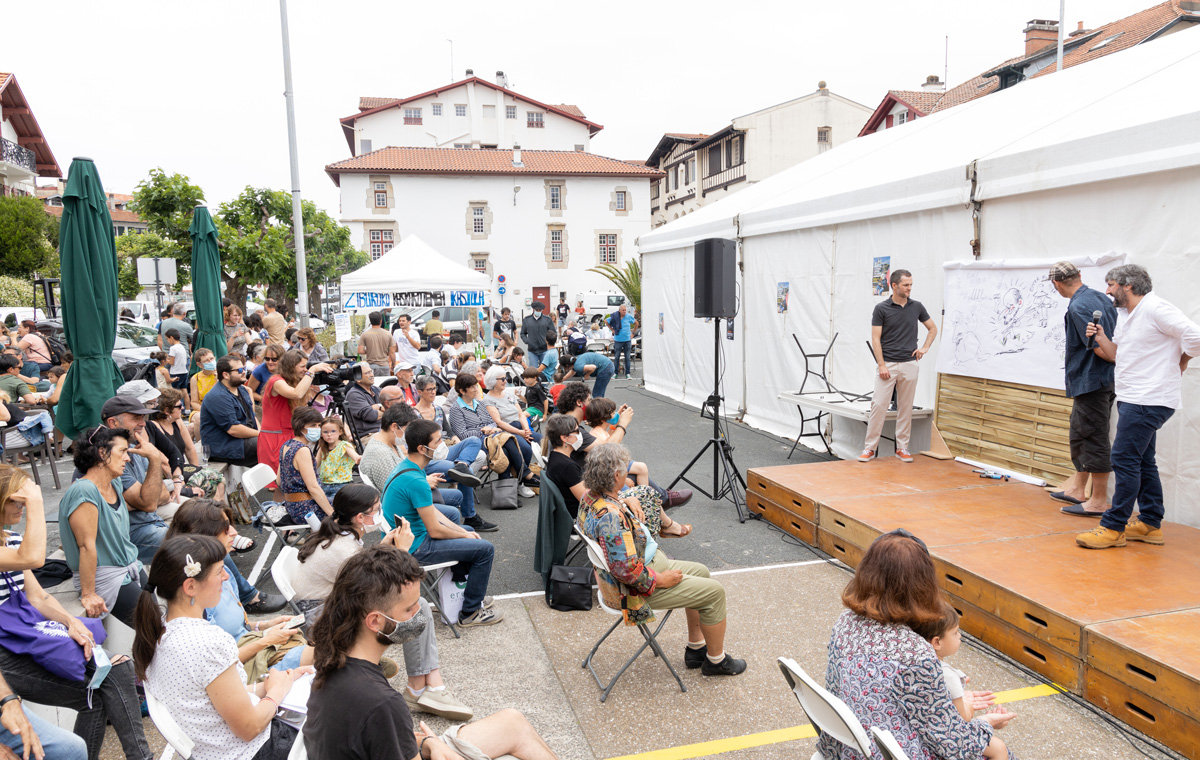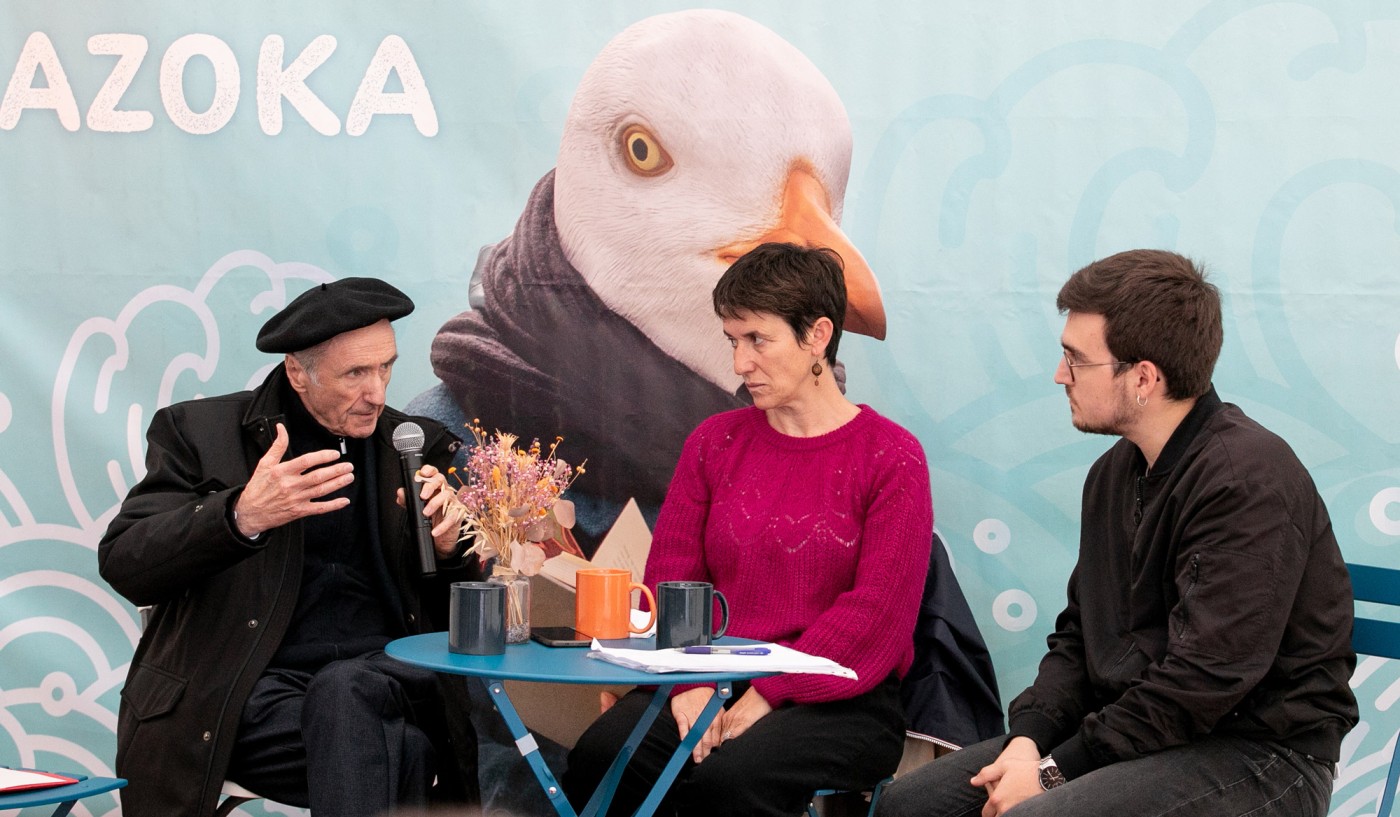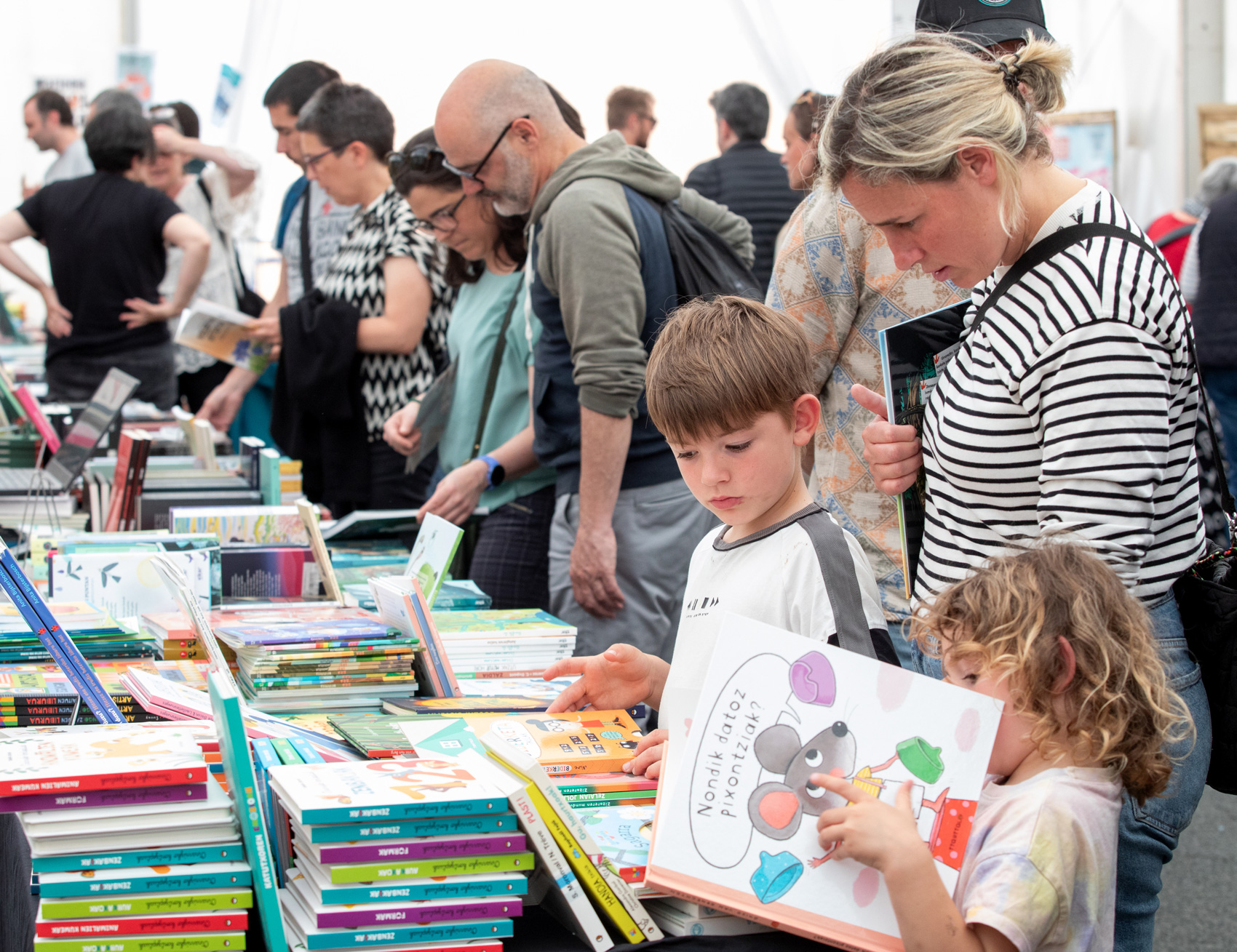A good formula to confirm that our small is big
- The second edition of the Feria del Libro y Disco Vasco, which we have jointly organised the Baltsan Ziburutarra and ARGIA partnership, has gone very well in Ziburu on 12 June. Readers, writers and editorial members have been at ease at the event and the organization has made a “very good” valuation, without being able to replicate later. They have fulfilled the objective of living the square in Euskera and in Euskera, and in the background, proposing a quote only in Euskera on the coast of Lapurdi is something... big.

People came home satisfied. The Book and Disco Vasco Fair of Ziburu has known to be hungry for books, hungry for Euskera and hungry for people, and eager to eat for all three. For the second time, the fair organized by the Baltsan and Argia association has passed through the coastal village of Lapurdi on the twelfth sunny day of June. Lezo, Azpeitia, Izpura, Oiartzun, Zarautz, Azkarate, Baiona, Iruñea, Orio, Urruña, Hendaia, Ozta, Hernani, Astigarraga... People from different parts of Euskal Herria have approached, as Maiatz’s writer Luzien Etxezaharreta says, “because Ziburu is an ideal place for the pooling of both sides.”
There were 23 publishers, publishing books in Basque, the largest of the small and the smallest, without any of them shading the other. Because they tell us that ours is small, and because we repeat over and over again that we are small. And, of course, we are small (next to the big ones), but leaving aside the creations written in French and Spanish and dedicating the whole plaza to those of Euskera, it is clear to us that our small is big. This belief could be done with simplicity and pride by discovering the menu of the Plaza de Ziburu.
Among them was the editorial Pamiela, in which his colleague Peio Elzaburu was present with a “special attachment”: “We are a Navarra publisher, although then fortunately we are not in the situation of Ipar Euskal Herria, we have also had bad seasons and passed them, so we have always responded affirmatively to all the gummies of Ipar Euskal Herria. We know that the community is important, we are minority and we know how important the meeting point is, we understand it very well the Navarros”.
Yes, it has been a meeting point, and the quality of the fair has allowed the closeness between writers and readers. Although people have gathered under the white tent mounted on the plaza, there have been no suffocating agglomerations, and there was time and space for conversation. As in Arteta we need to remember what is natural, Etxezaharreta warns us of the following: “It’s important for a writer to talk to the reader.” Yes, it is, and the phrase goes the other way: “It’s important for a reader to talk to the writer.” Oihana Arana has been presenting the book of poems Lazunak azkazaletan, published with the editorial Susa and which has just published Euskaltzaindia. He also likes this exchange: “I like to see something that has been so long inside yourself as it then changes shape, as people live. It changes, what one writes and what the other reads is never the same, because in the end each one reads every book from where it is and from what one lives, and to me the confrontations that are created there seem to me always interesting.”
We believe this exchange is necessary, now that we step out of COVID-19, the third person lonely. Speaking with different publishers, we have also talked about the influence of this context and say that, in general, it has not been a brutal blow to book production. “The books have followed their path, writing to the writers, reading the readers... this movement has not been interrupted by the situation, what we have lost is the exchange of writers and readers: greeting, congratulating each other or joining us and commenting on the book”, in the words of Itziar Ugarte, of Susa. The Ziburu Market considered that it was a date to recover what was lost. Of the same opinion is Elzaburu de Pamiela: “If there’s a lot of emotion, you notice that this good habit of reading hasn’t been lost, even more people are hungry.”
In the morning, after the presentations of books and the bertsos program Marrazko-marrazkio spent the hours, Odei Barroso and Maddi Ane Txoperena were still there, happy, telling them stories. “It’s been almost a year since I didn’t sing in a plaza… it has fulfilled many functions, including responding to the hunger of the people, it has offered us a social life; and it has affected me also in the artistic life, it has invited me to sing in the plaza, I have thanked that being with the people.” In the same way goes Txoperena: “I have acted in much more formal settings and rooms, but I have thanked the closeness with the people who have offered us today. It’s been a meeting day, I’ve found a lot of people I hadn’t seen for a long time.” They have also thanked that the fair has been dedicated to Basque books and records: “This positive discrimination is positive”; “it is good that it has been strictly limited, otherwise it eats us to others.”
Saturday’s day also took place at the Euskalduna Palace in Bilbao, with presentations by seven writers, directed by the journalist of Euskal Irrati Telebista Maia Muruaga: In Ene vive Maddi Ane Txoperena, Asiskoren Sugarren mende, Naparra de Jon Alonso, open case, Mikel Antza and Adur Larrea Burgosko auzia: iraultza eta bizi!, The plants of the Jakoba Errekondo House, the Lazunak of Oihana Arana on the nails and the Susmaezinak of Itxaro Borda. In total, the publishers put on the table some 60 novelties this year, along with hundreds of others they had in previous years.
Centrality in the production of books in Basque
“It is satisfactory to give visibility and centrality to the production of books in Euskera,” says Ugarte de Susa. The choice of the organizers has only been to offer space for the production of books in Basque and channel communication only in Basque. A daring and political choice, a diglossia in an atmosphere of violence for Ipar Euskal Herria, that if he introduces the Basque language, he selects bilingualism. Brave, political and grateful for those of us who want to live in Basque. More than one ziburutarra was delighted to see the plaza in Euskera.
Although the time for evaluation has not yet come, Ladix Arrosagarai, a member of Baltsan, in the interview with the editorial, made a “very positive” at the end of the day: “Our goal is to support book production, and we are pleased that more readers have come to this second edition and publishers have also sold more.”
“[In the Northern Basque Country] there are few bookstores, and in those few there are products in Basque that are not available. And if they're not spectacular, they don't buy them. Therefore, we want to give visibility and accessibility to production in Euskera”, he noted in the presentation of the fair Adur Larrea, member and creator of Baltsan comics.
“The whole square has spoken in Basque throughout the day,” says Arrosagarai, joyfully. An unbeatable victory for a Ziburu that has about 12% of the Basques. In Ipar Euskal Herria, with 310,000 inhabitants, there are 51,000 Euskaldunes who, without any confession, live in Euskera as they are made against the current, from the conscience and the heart.
From school to plaza
Among them, we have children and, if we look at the most typical ages, the data is better: two out of three children are educated in Basque – in full or bilingual. But the problem is that many have the language they have heard between the four walls of the school, because both at home and in the plaza they have French as a language to use.
Concerned about this linguistic situation, even for a single day, they wanted to bring up through the fair this children's reality: “That you listen to the Basque in the plaza of your people, together with your parents, with pleasure and without pressure,” answered the organizer and writer Maddi Zubeldia, asked about his objective in the face of children. Thus, a few months earlier they had contacted the schools and created the story of Iturri Zaharra with the Cuentist Bernadette Irazoki and with the help of mandoline Mixel Klaudio, guitarist Txomin Aritzaga and the accordionist Xano Urtxegi.
In 1676, in the old fountain of the villa, each school has published a song in which the water element is mentioned. “This place has magic. We have drunk from the old source, discovered the function of the source, of telling stories, of gathering together and have seen its importance. It’s our source, it’s exhausted... but today it didn’t run out,” says Zubeldia, still enchanted with the lived moment. They have not been directly told that the metaphor of the Basque Country and the encounter in Euskera could be the source, but without giving it a formal explanation they would relate to the environment surrounding them. Leaving the source, they all ended up in the market, children and parents: “There have been people who were not going to go to the fair thanks to the story of the Old Fountain and they have been taught that they can also enjoy in Basque outside the school,” Arrosagarai said. The old fountain has a quote that Zubeldia wants to repeat every year.
Like Iturri's quote, the organizers also want to repeat the appointment of the plaza. The journalist has wondered about the need to expand fame, in a popular and familiar atmosphere favored by the small size of the fair. The answer – given in a personal capacity – is as follows: “We can go a couple of steps higher, but not much … if not, we should move to a bigger place, but in that case we would leave the plaza and our goal is for the Basque country to take the plaza directly. Therefore, it increases, but within the limits given to us by the plaza.” Even if it is one day a year, we will be lucky enough to live the Plaza de Ziburu in Basque.
The market ended with the concert of Aguxtin Alkhat and Julien Labat. The fair opened its doors and there were many who extended the day in the terraces of the bars Maitenia and Bittor de la plaza, two of the most appreciated Basque accommodations for the Basques throughout the year.
Below are the photos of Dani Blanco:





What place does the theater have in a showcase like the book and the Basque fair of Ziburu? Or in other words, how much does the theater of literature have? This question was the starting point for Daniel Landart and Arantxa Hirioien at the round table Zubiburu of the opening... [+]
Berrogei argitaletxe eta diskoetxe, horietarik bederatzi berri, eta 120 salmahai bosgarren Ziburuko liburu eta disko azokan. Ekainaren lehenean ospatuko dute Baltsan elkarteak eta Argia hedabideak



















